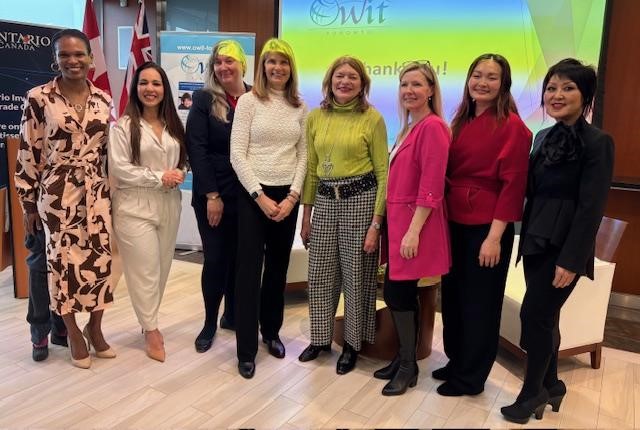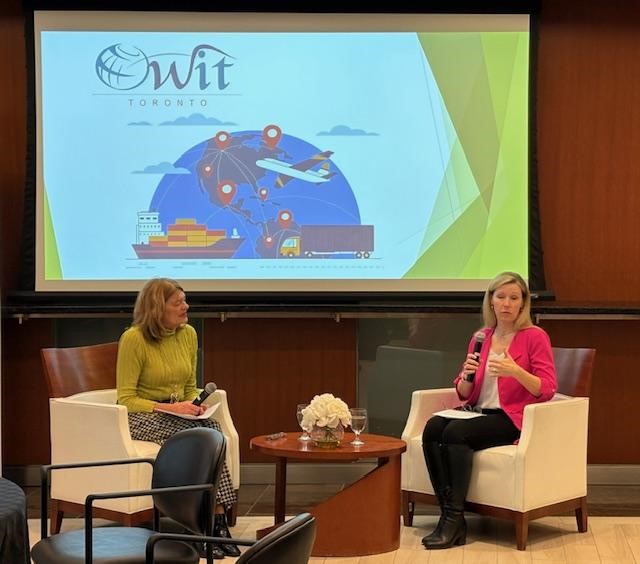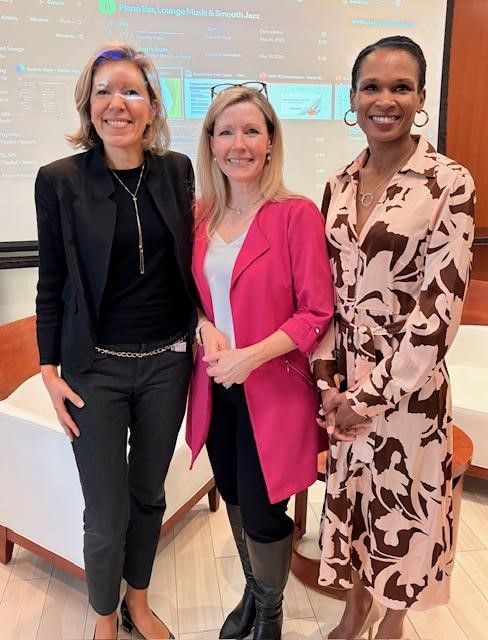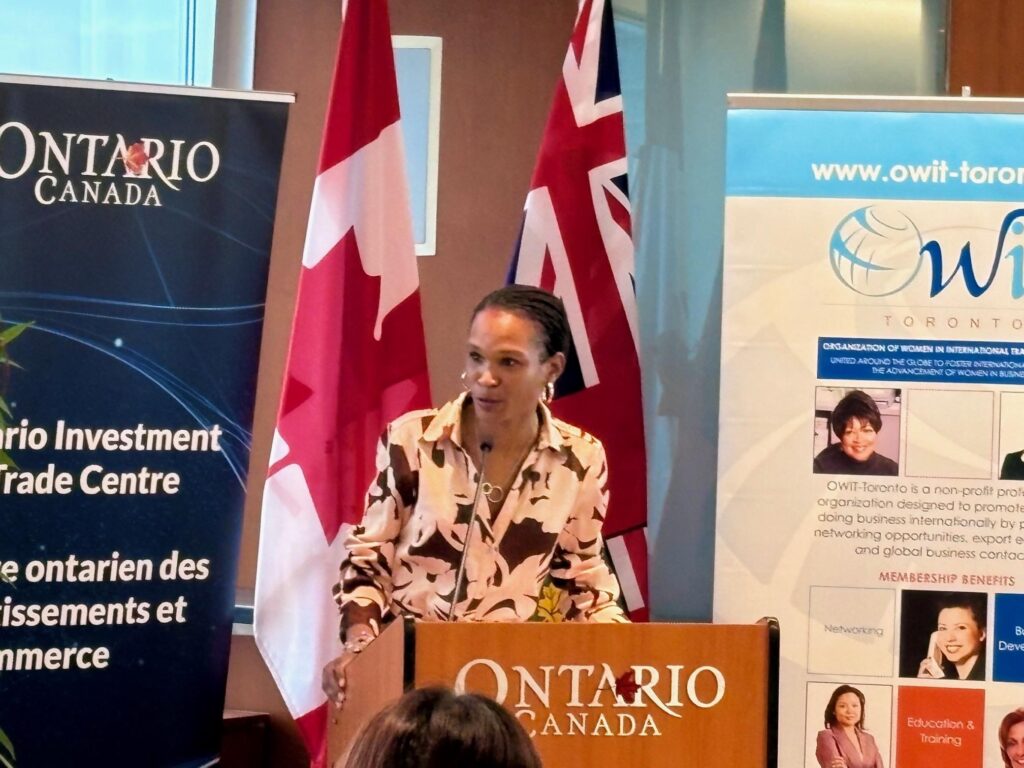Women Leading Global Trade: Toronto’s International Women’s Day Event

On March 20, Women Entrepreneurship Knowledge Hub (WEKH) executive director Sabine Soumare and program manager Peggy Harvey joined leaders and changemakers at an International Women’s Day event hosted by the Organization of Women in International Trade (OWIT)–Toronto.
Supported by WEKH, the City of Toronto and Global Affairs Canada, the event—Women who trade, women who lead: Shaping the future of global trade—focused on advancing women’s participation in international trade and leadership.
The event opened with a fireside chat between Sara Wilshaw, Canada’s chief trade commissioner, and Susan Baka, co-president of OWIT–Toronto. Their conversation explored Wilshaw’s career as a woman in diplomacy, current trade issues– including the current Canada–U.S. trade relationship– and the broader impact of global trade dynamics on women entrepreneurs.
Following the discussion, Rowena Ko from the Ontario Regional Office of the Trade Commissioner Service delivered a presentation highlighting the support and resources available to Canadian women entrepreneurs looking to expand into international markets.
Soumare delivered the closing remarks, emphasizing the need to improve access to global markets for women-led businesses, referencing data from the recent executive summary The State of Women’s Entrepreneurship in Canada 2025 (SOWE) and tools offered by WEKH.
From diplomatic corps to chief trade commissioner: A woman’s journey in global trade
With over 30 years of experience in diplomacy and international trade, Sara Wilshaw, Chief Trade Commissioner, Global Affairs Canada, offered a candid reflection on navigating a field long dominated by men. Her journey is not just about rising through the ranks of government– it’s about reshaping global trade to be more inclusive and empowering for women. “We recognized that we needed to be more deliberate and intentional about how we help women who typically have faced more challenges in international trade, whether that’s financing or networks. The program [Business Women in International trade – BWIT] started 25 years ago. And, we’re very proud that it continues.”
Wilshaw spoke openly about the systemic barriers women continue to face in reaching leadership positions, particularly in foreign public service. Throughout her career, she has contributed to key trade negotiations, including the evolution of the North American Free Trade Agreement (NAFTA) into the Canada-United States-Mexico Agreement (CUSMA), and has been a driving force behind Canada’s market diversification efforts.
Trade today: Diversification, free trade agreements and export opportunities

Wilshaw emphasized the need to reduce Canada’s long standing reliance on the United States as a primary trade partner. While the U.S. remains vital to Canadian exports, she noted that the ongoing tariff disputes are driving up costs for Canadian businesses. Wlishaw said, “we don’t expect everybody to turn away from the United States. The products and services from Canada still go to the U.S. It’s just going to cost more and that might make us less competitive.”
To diversify trade opportunities, Wilshaw pointed to Free Trade Agreements (FTA), such as the Comprehensive Economic and Trade Agreement (CETA) with Europe. She described Europe as a transparent, rules-based market and highly complimentary for Canadian exports. Although some non-tariff barriers remain, CETA is one of Canada’s most robust yet underutilized agreements.
Wilshaw also highlighted the increasing strategic importance of the Indo-Pacific region. Recent “Team Canada” trade missions have explored opportunities in Japan, South Korea, Vietnam and Thailand. Canada has also led women-focused trade missions to Taiwan and expanded relationships with Australia and New Zealand— two markets she described as especially attractive for new exporters due to their shared language, familiar business cultures and similar regulatory systems.
Canada–U.S.–Mexico trade
Wilshaw underscored the ongoing importance of the trilateral CUSMA, highlighting the deeply integrated nature of North American trade. Key industries— such as automotive, aerospace and agriculture— depend on cross-border supply chains, with good moving between countries multiple times during production. Although the U.S. dominates regional logistics,the ongoing tariff trade war and trade uncertainty have prompted the need to strengthen ties with Mexico. She identified sectors such as mining, oil and gas as key areas where Canada already has substantial investments that could serve as foundations for broader collaboration.
Practical advice: Take action and use your networks
Wilshaw urged women entrepreneurs to embrace global market opportunities with confidence: “just do it.” She acknowledged that while international trade can be complex, many global markets are open and eager to welcome Canadian businesses including women-owned businesses. Success, she noted, requires preparation and persistence. Expanding into new markets takes time, planning and support. Wilshaw encouraged the women entrepreneurs in the audience to connect with the Government of Canada’s Trade Commissioner Service (TCS), which follows a “no wrong door” approach. “We serve or we refer, and we try never to drop anyone,” she said.

She also addressed common challenges for women entrepreneurs, such as limited financing, smaller networks and the nature of service- or home-based businesses. Still, she highlighted growing support through Export Development Canada, the Business Development Bank of Canada and various municipal and provincial initiatives. Findings released on March 5, 2025 from The State of Women’s Entrepreneurship in Canada 2025 (#SOWE2025) shows that women are majority owners of almost 20% of private sector businesses and employ close to one million people. Women have worked hard to grow their businesses and have bridged many gaps – they now are almost as likely to export as men with 14.5 percent of businesses majority-owned by women versus 15.3 percent of those majority-owned by men in 2023. This means their businesses are just as affected by the tariff wars and trade barriers are a growing concern, particularly for those in textiles, apparel, and food production.The State of Women’s Entrepreneurship in Canada (#SOWE2025) also shows that fully women-owned small and medium-sized enterprises (SMEs) were more likely to export services than men (52.3% vs 43.9%) in 2023, up from 46.0% to 47.6% in 2017. However the women-fully owned SMEs were less likely to export goods (women 23.9% vs men 35.9%) in 2023, compared to 2017 (women 38.3% vs men 40.8%). Additionally, majority women-owned SMEs are exploring beyond the United States—reflecting a broader approach to trade diversification. These patterns underscore the importance of inclusive and targeted trade support and access to international networks, especially for women and immigrant entrepreneurs.
Connecting to support: Resources from the trade commissioner service
Following the fireside chat, Rowena Ko provided an overview of the Trade Commissioner Service and its suite of support for Canadian exporters. She highlighted key resources including trade missions, customized guidance, and funding programs such as CanExport and Business Women in Trade. Rowena also emphasized the important role of trade champions—like herself—in promoting equity and creating opportunities for under-represented entrepreneurs, particularly women, in global markets. In addition to the Government of Canada’s TCS, WEKH.ca and its ecosystem partners have the tools for women entrepreneurs to advance.
Closing insights: Data and resources from SOWE 2025

To conclude the event, Sabine Soumare shared research from SOWE 2025. She noted that 64% of women entrepreneurs believe potential U.S. tariffs will negatively affect their businesses. Still, 77% have already taken steps to adapt, including diversifying supply chains, adjusting pricing and refining marketing strategies.
Soumare also showcased tools from WEKH, including the See it. Be it. database which profiles more than 2000 women entrepreneurs and the national Sharing Platform, which connects women entrepreneurs to programs beyond trade, potential business and women entrepreneurship organization partners and resources. She encouraged attendees to explore WEKH’s flagship annual research report, SOWE 2025, for more insights into the evolving landscape of women’s entrepreneurship in Canada. She closed by reaffirming WEKH’s ongoing collaboration with OWIT and a shared commitment to advancing women in trade through data-driven research, strategic partnership and equitable access to support.
